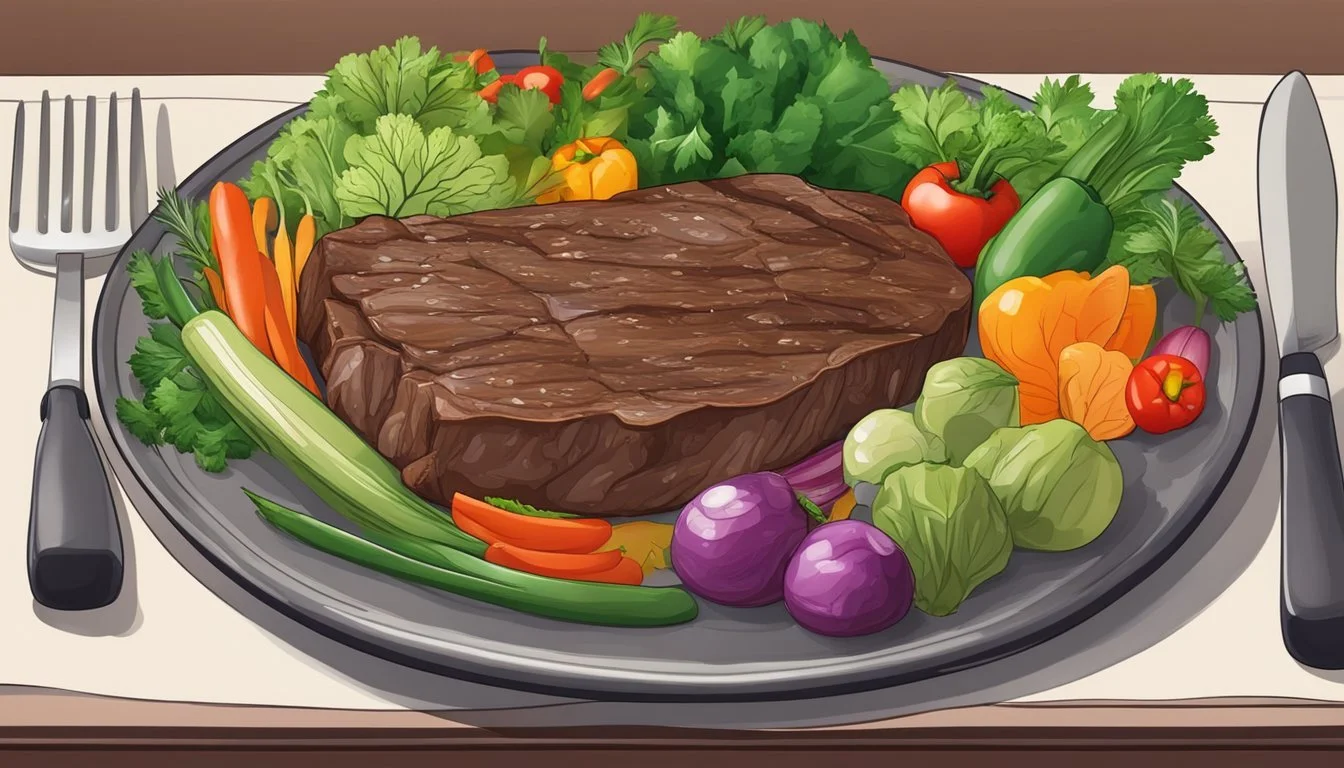10 Carnivore Diet-Friendly Foods for Post-Workout Recovery
Boost Your Results
The Carnivore Diet, focusing on animal-based foods, is becoming increasingly popular among those looking to optimize their fitness and recovery routines. This diet emphasizes simple, nutrient-dense foods like meat and fish, which can support muscle repair and overall recovery after intense workouts.
Choosing the right foods is essential for effectively using the Carnivore Diet to enhance post-workout recovery. By focusing on high-quality protein sources and essential nutrients found in animal products, individuals can maximize their recovery process, ensuring they are well-fueled for their next training session.
1) Grass-Fed Beef Steaks
Grass-fed beef is an excellent choice for post-workout recovery due to its superior nutrient profile. Unlike grain-fed beef, grass-fed beef boasts higher levels of essential nutrients such as Omega-3 fatty acids and conjugated linoleic acid (CLA), which help reduce inflammation and support muscle repair.
Rich in high-quality protein, grass-fed beef steaks provide the building blocks necessary for muscle recovery and growth. Protein is crucial after a workout, as it aids in repairing the tiny tears in muscle fibers caused by intense exercise.
Additionally, grass-fed beef is a valuable source of vitamins and minerals like iron and zinc. Iron is essential for oxygen transport in the blood, ensuring muscles receive enough oxygen to function and recover efficiently. Zinc plays a role in immune function and protein synthesis, further contributing to recovery.
Grass-fed beef also contains creatine, a compound known to enhance muscle recovery and boost performance during high-intensity exercises. This makes it an ideal protein source for athletes and fitness enthusiasts aiming to maximize their post-workout nutrition.
Incorporating grass-fed beef steaks into your diet can provide a balanced approach to recovery, combining essential nutrients with high-quality protein. This makes it a prime choice for those following a carnivore diet and seeking an effective post-exercise meal.
2) Wild-Caught Salmon
Wild-caught salmon is an excellent choice for post-workout recovery. Packed with high-quality protein, it aids in muscle repair and growth. Each serving provides essential amino acids that are crucial for recovery after intense physical activities.
Beyond protein, wild-caught salmon is rich in omega-3 fatty acids. These healthy fats are known for their anti-inflammatory properties, helping to reduce muscle soreness and improve overall recovery. This can be particularly beneficial after strenuous workouts.
Additionally, wild-caught salmon is a good source of B vitamins, selenium, and phosphorus. These nutrients play a vital role in energy production and maintaining a healthy metabolism. Consuming wild-caught salmon can help replenish these nutrients, which are often depleted during exercise.
For those on a carnivore diet, wild-caught salmon is a versatile and nutrient-dense option. It can be prepared in various ways, including grilling, baking, or pan-frying. Simple recipes, like pan-fried salmon or honey garlic salmon, are easy to follow and delicious. This makes wild-caught salmon both a convenient and effective option for post-workout meals.
3) Bison Ribeye
Bison ribeye stands out as a top choice for post-workout recovery on the carnivore diet. This meat is packed with high-quality protein, essential for muscle repair and growth. Athletes benefit from the protein content, which aids in prompt muscle recovery after intense exercise sessions.
In addition to protein, bison ribeye is rich in vital nutrients like iron, zinc, and B vitamins. These nutrients support red blood cell production, immune function, and energy metabolism, all crucial for athletic performance and recovery.
Bison ribeye is also lower in fat compared to beef ribeye, making it a lean option for those mindful of calorie intake. Despite being leaner, it maintains a tender texture and robust flavor, making it a satisfying post-workout meal.
Cooking bison ribeye can be simple: season with salt and pepper, then grill, broil, or pan-sear to desired doneness. Pairing it with some salt ensures electrolyte balance, which is important after a workout.
This cut of meat is versatile and can easily be adapted to various recipes while maintaining its nutritional benefits. Including bison ribeye in the diet can help enhance recovery and support overall athletic goals.
Reliable and nutrient-dense, bison ribeye is an excellent choice for those following a carnivore diet and looking to optimize their post-workout nutrition.
4) Turkey Breast
Turkey breast is a staple protein source ideal for post-workout recovery on a carnivore diet. Rich in lean protein, it supports muscle repair and growth. Each serving contains essential amino acids that aid in rebuilding muscle fibers stressed during exercise.
This meat is low in fat, making it a clean option for those focusing on protein intake. It's also an excellent source of B vitamins, which play a crucial role in energy metabolism and reducing fatigue.
Turkey breast is versatile and can be prepared in various ways, such as grilling, baking, or pan-searing. This flexibility allows for easy incorporation into different meal plans without compromising on nutritional quality.
Additionally, turkey breast contains minerals like zinc and selenium. These contribute to immune function, which is beneficial for overall recovery. Its high protein-to-fat ratio ensures that athletes get the necessary nutrients without excess calories.
5) Coconut Oil
Coconut oil, a versatile oil derived from the meat of mature coconuts, can be an exemplary addition to a carnivore diet for post-workout recovery.
It provides medium-chain triglycerides (MCTs) that the body quickly absorbs and converts into energy. This can help replenish the body's energy stores after intense exercise.
The fatty acids in coconut oil also have anti-inflammatory properties. These properties may aid in reducing muscle soreness and promoting faster recovery.
It can be easily incorporated into various meals. For example, one could use it for cooking meats or drizzling over cooked vegetables.
Coconut oil is also suitable for blending into beverages, such as protein shakes, to provide a quick source of energy and healthy fats.
6) Cage-Free Eggs
Cage-free eggs are a powerhouse of nutrition, making them an excellent choice for muscle recovery. High in protein and essential amino acids, they help repair and build muscle tissue after intense workouts.
In addition to protein, eggs contain important nutrients such as choline and vitamin D. Choline supports muscle function, while vitamin D aids in calcium absorption, crucial for bone health.
Their protein quality is unmatched, providing all nine essential amino acids necessary for muscle growth. Bioavailability of these proteins is high, meaning the body can easily absorb and utilize them efficiently.
Cage-free eggs also offer a range of B vitamins, including B12, which enhances energy metabolism. This is particularly beneficial for those engaging in regular, strenuous physical activity.
Incorporating cage-free eggs into post-workout meals can be simple. Options like scrambled eggs with avocado or a boiled egg salad can provide quick, nutritious recovery snacks. These versatile eggs fit well within the principles of a carnivore diet.
7) Chicken Thighs
Chicken thighs are an excellent choice for the carnivore diet, offering a flavorful and nutrient-dense option for post-workout recovery. They are rich in protein, which is essential for muscle repair and growth. Additionally, the higher fat content in chicken thighs compared to breast meat provides sustained energy and satiety.
Seasoning chicken thighs is simple and can enhance their natural flavors. Common seasonings include salt and pepper, garlic powder, and paprika. These can be cooked in various ways, such as baking, pan-frying, or grilling, making them a versatile addition to any meal.
Cooking techniques like searing the thighs in a skillet and then transferring them to the oven can help achieve perfectly crispy skin while maintaining juicy meat. Preheating the oven to around 375°F (190°C) and baking until the internal temperature reaches 165°F (74°C) ensures the thighs are cooked through safely.
Resting the chicken thighs for about 10 to 15 minutes after cooking allows the juices to redistribute, resulting in a moister and more tender texture. This step is crucial for maximizing the enjoyment and benefits of this protein-packed food.
8) Duck Breast
For those on the Carnivore Diet, duck breast can be an excellent addition to a post-workout recovery meal. Known for its rich flavor and high-fat content, it provides essential nutrients and energy.
Duck breast is packed with protein which aids in muscle repair and growth. A single serving can deliver a substantial amount of protein, making it an effective option after intense workouts.
The fat content in duck breast is also beneficial. It contains healthy fats that can provide sustained energy levels, helping with overall stamina. The fats also contribute to the body's ability to absorb fat-soluble vitamins.
Additionally, duck breast is a good source of iron and zinc. Iron is crucial for transporting oxygen in the blood, while zinc supports the immune system and promotes healing.
Preparation is straightforward. Roasting or grilling are popular methods. Season simply with salt and pepper to enhance the natural flavors. Resting the meat after cooking ensures it remains tender and juicy.
By incorporating duck breast into your post-workout routine, you maintain adherence to the Carnivore Diet while benefiting from a nutrient-rich source of protein and fat.
9) Beef Liver
Beef liver is a standout choice for post-workout recovery on the carnivore diet. Rich in essential nutrients, it provides a potent mix of protein, vitamins, and minerals that support muscle repair and overall recovery.
High in protein, beef liver helps rebuild muscle fibers torn during exercise. This makes it invaluable for those looking to maximize their strength and endurance.
Beef liver is a leading source of vitamin A, which is crucial for immune function and cell growth. This can help athletes stay healthy and recover more quickly between workouts.
This organ meat is also packed with B vitamins, including B12 and riboflavin. These vitamins aid in energy production and reduce fatigue, ensuring that one can maintain energy levels throughout the day.
Iron content in beef liver is significant, providing a boost to blood health and oxygen transportation. Improved oxygen delivery can enhance athletic performance and accelerate recovery times.
Incorporating beef liver into the diet can be as simple as sautéing or pan-frying it with some butter. This not only enhances its flavor but also retains its nutritional value, making it an efficient post-workout meal.
10) Pork Chops
Pork chops are a valuable addition to a carnivore diet, offering a high protein content that is crucial for muscle repair and growth after strenuous workouts. Each serving provides essential amino acids necessary for muscle recovery.
Rich in vitamins and minerals, pork chops supply important nutrients like vitamin B6, vitamin B12, and zinc, which support immune function and overall well-being. The presence of niacin also aids in energy metabolism, making pork chops a practical choice for post-exercise nutrition.
Including pork chops in post-workout meals can help maintain satiety and replenish energy levels. The fat content in pork chops offers an additional energy source and helps in the absorption of fat-soluble vitamins.
Prepared using healthy cooking methods such as grilling or baking, pork chops can be part of a balanced diet. Whether paired with other protein sources or enjoyed on their own, they contribute to a comprehensive approach to recovery in a carnivore diet.
Benefits of Carnivore Diet for Post-Workout Recovery
The carnivore diet can offer significant advantages for those looking to enhance their post-workout recovery. Focus on muscle repair and reducing inflammation are key aspects of this dietary approach.
Muscle Repair
One primary benefit of the carnivore diet is its potential to support muscle repair. High-quality protein intake is crucial for muscle recovery, and this diet provides an abundant supply. Animal-based foods are rich in essential amino acids, which play a vital role in muscle synthesis.
Consuming proteins like beef, poultry, and fish rapidly provides the necessary building blocks for muscle tissue. This can potentially lead to increased muscle growth and strength. The high bioavailability of these proteins ensures that the body efficiently utilizes them, speeding up recovery times after strenuous workouts.
Additionally, the presence of nutrients like creatine and zinc in red meats further enhances muscle repair. Creatine aids in muscle energy production, while zinc supports cellular functions and the immune system. Together, these nutrients contribute to improved muscle recovery and athletic performance.
Reducing Inflammation
Reducing inflammation is another significant benefit of the carnivore diet. Chronic inflammation can impede recovery and lead to prolonged muscle soreness. The carnivore diet's emphasis on eliminating plant-based foods, which can sometimes cause inflammation, may reduce overall inflammation levels.
Omega-3 fatty acids, found in fatty fish like salmon, play an essential role in combating inflammation. These healthy fats help modulate the body's inflammatory response, promoting a quicker recovery. Eating a diet rich in omega-3s ensures that the body maintains a balanced inflammatory state post-exercise.
Moreover, the diet's exclusion of processed carbohydrates and sugars, which can increase inflammation, further supports a reduced inflammatory response. By focusing on nutrient-dense animal products, the carnivore diet helps maintain optimal inflammation levels, aiding in quicker post-workout recovery.
Nutrient Profiles of Carnivore Diet Foods
Carnivore diet foods primarily include animal products such as meat, seafood, and certain dairy. These foods are dense in proteins, essential fatty acids, and vital micronutrients necessary for muscle recovery and overall health.
Protein Content
Protein is crucial for muscle repair and growth. Meats like beef, pork, and lamb are rich in high-quality proteins containing all essential amino acids. Lean cuts such as chicken breast and turkey also provide significant protein amounts.
Example Protein Content per 100g:
Beef: 26g
Chicken Breast: 31g
Pork: 21g
Eggs are another excellent protein source with around 13g per 100g. Fish, especially fatty varieties like salmon, provide both proteins and other beneficial nutrients.
Essential Fatty Acids
Essential fatty acids, particularly omega-3 and omega-6, play a vital role in reducing inflammation and promoting heart health. Fatty fish like salmon, mackerel, and sardines are rich in omega-3s.
Example Omega-3 Content per 100g:
Salmon: 2.3g
Mackerel: 2.5g
Sardines: 1.4g
Grass-fed meats also contain higher omega-3 levels compared to grain-fed options. Including these fats aids in joint health and overall recovery post-workout.
Micronutrients
Carnivore diet foods offer a variety of essential micronutrients. Organ meats like liver are particularly nutrient-dense, providing high amounts of vitamins A, B12, and iron.
Micronutrient Highlights per 100g:
Beef Liver: 988% DV (Vitamin A), 800% DV (Vitamin B12), 31% DV (Iron)
Oysters: 605% DV (Zinc), 300% DV (Vitamin B12)
Eggs: 14% DV (Vitamin B12), 26% DV (Selenium)
Seafood like oysters and clams are rich in zinc and vitamin B12, crucial for immune function and energy metabolism. Dairy products, including cheese, provide calcium and vitamin D, beneficial for bone health.
By including a variety of these foods, the carnivore diet ensures a comprehensive intake of essential nutrients to support recovery and overall well-being.
Optimizing Post-Workout Recovery on a Carnivore Diet
Effective post-workout recovery on a carnivore diet involves focusing on meal timing to maximize muscle repair, maintaining proper hydration, and incorporating a variety of nutrient-dense animal foods.
Timing of Intake
Consuming protein-rich foods shortly after a workout is crucial. Aim to eat within 30 to 60 minutes post-exercise when muscles are most receptive to protein synthesis. Beef, chicken, fish, and eggs provide complete proteins essential for muscle repair.
Spreading protein intake evenly throughout the day can also support continuous muscle recovery. Include steak or grilled chicken in meals to ensure a steady supply of amino acids.
Hydration Considerations
Proper hydration is critical for muscle recovery and overall performance. Even though the carnivore diet often prioritizes protein and fats, water intake should not be overlooked. Drinking water throughout the day helps to prevent dehydration and supports metabolic processes.
Electrolyte balance is also important, especially on carbohydrate-restricted diets. Including sources of sodium, potassium, and magnesium, such as bone broth or organ meats, can help maintain this balance.
Incorporating Variety
To prevent dietary monotony and ensure a broad spectrum of nutrients, incorporate a variety of animal-based foods. This includes different cuts of meat, seafood, and organ meats. Each offers unique benefits; for instance, liver is rich in essential vitamins and salmon provides omega-3 fatty acids.
Mixing up protein sources not only enhances recovery but also improves overall nutritional intake. Switching between beef, lamb, poultry, and fish can offer different amino acid profiles and micronutrients.













